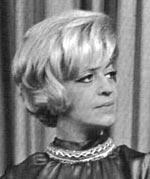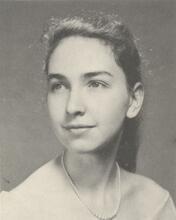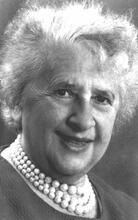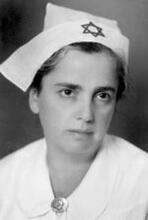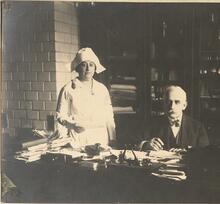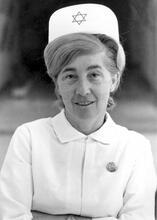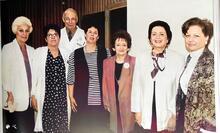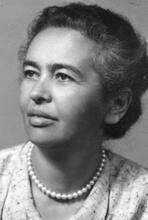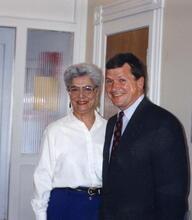Charlotte Friend
Cell biologist and immunologist Charlotte Friend furthered our understanding of cancer through her discovery of a virus that could transmit leukemia. She worked for the Sloan-Kettering Institute for Cancer Research and later became director of the Center for Experimental Cell Biology at Mount Sinai Medical School. While at Sloan-Kettering she isolated a virus that could transmit leukemia in mice, the Friend leukemia virus, which was used as a model for virally transmitted cancers and would help those studying the regulation and control of cell proliferation and differentiation. She served as president of the New York Academy of Sciences and the American Association for Cancer Research, and she helped create the Israeli Cancer Research Fund, which helped encourage Israeli scientists to focus on cancer research.
Article
Cell biologist and immunologist Charlotte Friend made major contributions to our understanding of cancer and its causes. In the 1950s, she isolated a virus that produced leukemia in mice and could be transmitted experimentally from mouse to mouse. This virus became known as the Friend leukemia virus (FLV) and was one of the most widely used model systems for studying tumor-inducing viruses and cancer progression. Later, using cells derived from FLV-induced leukemia, Friend demonstrated that cancer cells such as these can be stimulated to differentiate along their normal pathway and thereby lose their unlimited growth potential. Friend’s erythroleukemia cells then became an important tool for those studying the regulation and control of cell proliferation and differentiation.
Charlotte Friend was born on March 3, 1921, in New York City, the daughter of Russian Jewish immigrants Morris Friend, a businessman, and Cecilia (Wolpin) Friend, a pharmacist. She had two older sisters and a younger brother, born after her father died when she was three years old. Her mother was left with four young children to raise during the Depression. Friend always admired her mother for never letting the children doubt that, although they were on “home relief,” they would complete their education. Friend, a true Renaissance woman, took advantage of all the opportunities and wonders New York offered. She graduated from Hunter College in New York City in 1943 and enlisted in the United States Navy, where she served as an officer in hematology laboratories. After the war, she enrolled as a graduate student at Yale University and received a Ph.D. in immunology in 1950. She returned to New York and joined the staff of the newly founded Sloan-Kettering Institute for Cancer Research. She remained there until 1966, when she became director of the Center for Experimental Cell Biology at the new medical school established by Mount Sinai Hospital.
Friend received national and international recognition for her achievements and contributions. Among her many honorary awards were the Alfred P. Sloan Award for Cancer Research (1962), the Prix Griffuel (1979), and the Papanicolaou Award (1982). In the 1970s, she was elected a member of the National Academy of Sciences and president of three major scientific societies: the New York Academy of Sciences, the American Association for Cancer Research, and the Harvey Society. She was a strong supporter of the women’s movement and, throughout her career, was a role model and advocate for other women in science. Though not very religious, she was a strong supporter of Israel and its causes and was one of the original organizers of the Israel Cancer Research Fund, set up in 1975 to support the research efforts of young Israeli scientists at home and abroad. From its inception, Friend insisted that the award process be fair and objective and, to this end, was instrumental in recruiting the cream of the cancer research community to serve on the fund’s Scientific Advisory Board. When she was asked why she was working so hard for the organization, she replied, “Because I want to send my talents on Aliyah.”
Friend paved the way for a great many avenues of research on viruses, cell differentiation, and cancer. She was renowned for her generosity in distributing Friend virus and Friend cells to those who wanted to work with them and for providing the necessary guidance and assistance. Her demonstration of inducible differentiation of leukemic cells has served most recently as the inspiration and prototype for evaluating the potential therapeutic effects of differentiation-inducing agents in human cancer. Charlotte Friend died of lymphoma on January 7, 1987, shortly after receiving an honorary doctor of science degree from Brandeis University.
Selected Works
“Cell-Free Transmission in Adult Swiss Mice of a Disease Having the Character of a Leukemia.” Journal of Experimental Medicine 105 (1957): 307–318.
“The Coming of Age of Tumor Virology.” Cancer Research 37 (1977): 1255–1263.
“Hemoglobin Synthesis in Murine Virus-induced Leukemic Cells in Vitro: Stimulation of Erythroid Differentiation by Dimethyl Aulfoxide,” with W. Scher, J.G. Holland, and T. Sato. Proceedings of the National Academy of Sciences 68 (1971): 378–382.
Biographical Memoirs 63. National Academies Press, 1994: 126–148.
“Viral Oncogenesis and Cell Differentiation: The Contributions of Charlotte Friend.” Edited by L. Diamond and S.R. Wolman. Annals of the New York Academy of Sciences 567 (1989): 5–13.

